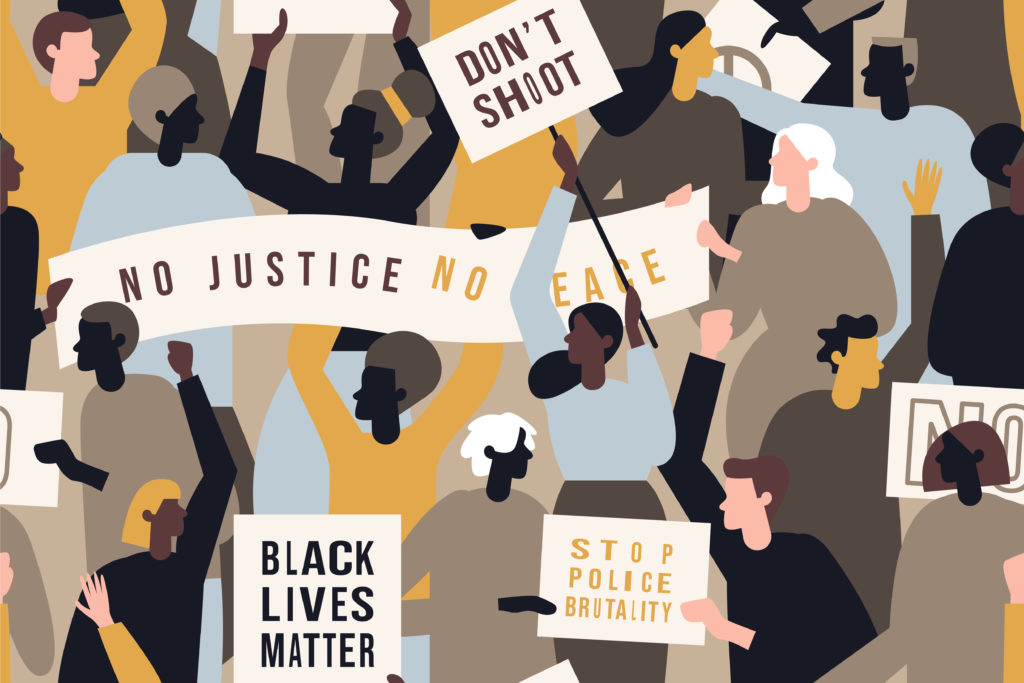Reprieve to Breathe: Reflections on the Death of George Floyd and the Trial of Derek Chauvin

On Tuesday, a tense nation had a weight lifted off its shoulders as former Minneapolis Police officer Derek Chauvin was convicted on all counts in the death of George Floyd, including unintentional second-degree murder, third-degree murder and second-degree manslaughter. It has almost been a year since the video of George Floyd’s death stirred and shocked Americans of all backgrounds, leading to gatherings for social justice, racial equality, and police reform.
The news inspired a cathartic moment for many, leading to a nationwide sigh of relief. However, the pertinent question remains: Will this verdict be the catalyst for a new age in which we can confidently and truly affirm that Black Lives Matter, and will the struggles for equality under the law lead to accountability and lasting change?
In this critical moment, with the attention of so many in our country and around the world focused on this issue, few words ring truer than those of President Joe Biden and Vice President Kamala Harris, both proven allies and advocates for change.
“No one should be above the law, and today’s verdict sends that message,” said the President in a speech from the White House. “But it’s not enough. It can’t stop here. In order to deliver real change and reform, we can and we must do more to reduce the likelihood that tragedies like this will ever happen again.”
As families and communities continue to mourn loved ones whose lives are lost to police brutality, excessive force, failure to de-escalate and reckless errors by the police, distrust continues to grow within a justice system that has historically marginalized and maligned people of color. According to the Washington Post, “Although half of the people shot and killed by police are White, Black Americans are shot at a disproportionate rate. They account for less than 13 percent of the U.S. population, but are killed by police at more than twice the rate of White Americans. Hispanic Americans are also killed by police at a disproportionate rate.”
“Because of smartphones, so many Americans have now seen the racial injustice that Black Americans have known for generations – the racial injustice that we have fought for generations,” said the Vice President, reflecting on the implications of the verdict. “Here’s the truth about racial injustice. It is not just a Black America problem or a people of color problem. It is a problem for every American. It is keeping us from fulfilling the promise of liberty and justice for all.”
The “right verdict” was reached in the Chauvin case – borrowing a phrase from the President – but placing the Chauvin conviction in its larger context, we have this moment, and this momentum, to advance the cause of racial equity and the fair and ethical treatment of every citizen. We must not let the moment devolve into empty gestures and platitudes, however well intended, such as the revision of the Law Enforcement Oath of Honor that was announced in January by the International Association of Chiefs of Police “to punctuate the importance of treating all individuals with dignity and respect and ensuring the preservation of human life.”
Rather, we need genuine and specific measures to mend these frays and implement long-overdue change, such as the laws enacted in a number of states in the aftermath of George Floyd’s death, imposing important restrictions on police power and oversight of law enforcement actions, and, on a national level, the George Floyd Justice in Policing Act of 2021, passed by Congress in March and now called before the Senate by President Biden himself. Many good, dedicated police officers, deeply troubled by the legacy of police brutality and bias in their ranks, welcome such reforms and are essential voices in this ongoing, urgent dialogue.
The George Floyd Justice Policing Act of 2021 addresses a wide range of policies and issues regarding policing practices and law enforcement accountability. Among other things, to enhance existing enforcement mechanisms to remedy violations by law enforcement, the bill:
- lowers the criminal intent standard—from willful to knowing or reckless—to convict a law enforcement officer for misconduct in a federal prosecution;
- limits qualified immunity as a defense to liability in a private civil action against a law enforcement officer; and
- grants administrative subpoena power to the Department of Justice (DOJ) in pattern-or-practice investigations.
It establishes a framework to prevent and remedy racial profiling by law enforcement at the federal, state, and local levels. It also limits the unnecessary use of force and restricts the use of no-knock warrants, chokeholds, and carotid holds.
In addition, the bill creates a national registry—the National Police Misconduct Registry—to compile data on complaints and records of police misconduct. It also establishes new reporting requirements, including on the use of force, officer misconduct, and routine policing practices (e.g., stops and searches).
Finally, it directs the DOJ to create uniform accreditation standards for law enforcement agencies and requires law enforcement officers to complete training on racial profiling, implicit bias, and – significantly – the duty to intervene when another officer uses excessive force.
One can’t help but imagine the difference that this proposed Act, which bears his name, would have made to George Floyd on May 25, 2020, had it been in effect on that fateful day.
Chauvin’s conviction this week does not bring George Floyd back, but hopefully it marks a historic turn in the way policing is conducted and in holding police officers more accountable for their actions. In the aftermath of this tragic, brutal death, we have been gifted a genuine opportunity to re-imagine and create a more balanced system of law enforcement and justice that works in service of us all.
